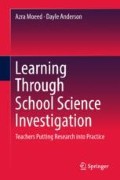Abstract
We have observed that just like the primary school teachers in the previous chapter, secondary school science teachers continually make changes to their practice to support student learning more effectively through a process of reflection and review. However, this process does not tend to be informed by published research. As in Chap. 5, our interest was to find out how access to published research evidence added to teachers’ reflection and the impacts it had on how they use science investigations in their classes. In this parallel chapter, we describe what happened when participating secondary school teachers made research evidence-based changes to their practice of science investigation.
Access this chapter
Tax calculation will be finalised at checkout
Purchases are for personal use only
References
Abrahams, I., & Millar, R. (2008). Does practical work really work? A study of the effectiveness of practical work as a teaching and learning method in school science. International Journal of Science Education, 30(14), 1945–1969.
Abrahams, I., & Reiss, M. J. (2012). Practical work: Its effectiveness in primary and secondary schools in England. Journal of Research in Science Teaching, 49(8), 1035–1055.
Hodson, D. (1990). A critical look at practical work in school science. School Science Review, 71(256), 33–40.
Hodson, D. (2014). Learning science, learning about science, doing science: Different goals demand different learning methods. International Journal of Science Education, 36(15), 2534–2553.
Millar, R. (2010). Analysing practical science activities to assess and improve their effectiveness. Hatfield: Association for Science Education. Retrieved from http://www.york.ac.uk/media/educationalstudies/documents/research/Analysing%20practical%20activities.pdf.
Ministry of Education. (2007). The New Zealand curriculum. Wellington: Learning Media.
Osborne, J. (2014). Teaching scientific practices: Meeting the challenge of change. Journal of Science Teacher Education, 25(2), 177–196.
Author information
Authors and Affiliations
Corresponding author
Appendices
Appendix 6.1
A checklist for analysing and comparing up to 10 practical activities
1 Learning objective (s) (or intended learning outcome(s))

Appendix 6.2
This framework by Millar (2010) was used to compare the change in practice a framework suggested by Millar (2010). It allows a comparison of up to 10 lessons. We used this framework to analyse the nine observed lessons in Phase 1 with the 9 lessons in Phase 2. We have also analysed and added the science capabilities for citizenship in Tables one and two (Appendix 6.2). In this table, Hazel is T1, Chris is T2 and Fran is T3. Science capabilities are identified as CP1 Gather and interpret data; CP2 Use evidence; and CP3 Critique evidence. To make sense of the details in the last two rows of the table see the key below the table (Tables 6.6 and 6.7).
Appendix 6.3: Student Reflective Survey

Rights and permissions
Copyright information
© 2018 Springer Nature Singapore Pte Ltd.
About this chapter
Cite this chapter
Moeed, A., Anderson, D. (2018). Science Investigation in Secondary School: Changes to Teacher Practice. In: Learning Through School Science Investigation. Springer, Singapore. https://doi.org/10.1007/978-981-13-1616-6_6
Download citation
DOI: https://doi.org/10.1007/978-981-13-1616-6_6
Published:
Publisher Name: Springer, Singapore
Print ISBN: 978-981-13-1615-9
Online ISBN: 978-981-13-1616-6
eBook Packages: EducationEducation (R0)

